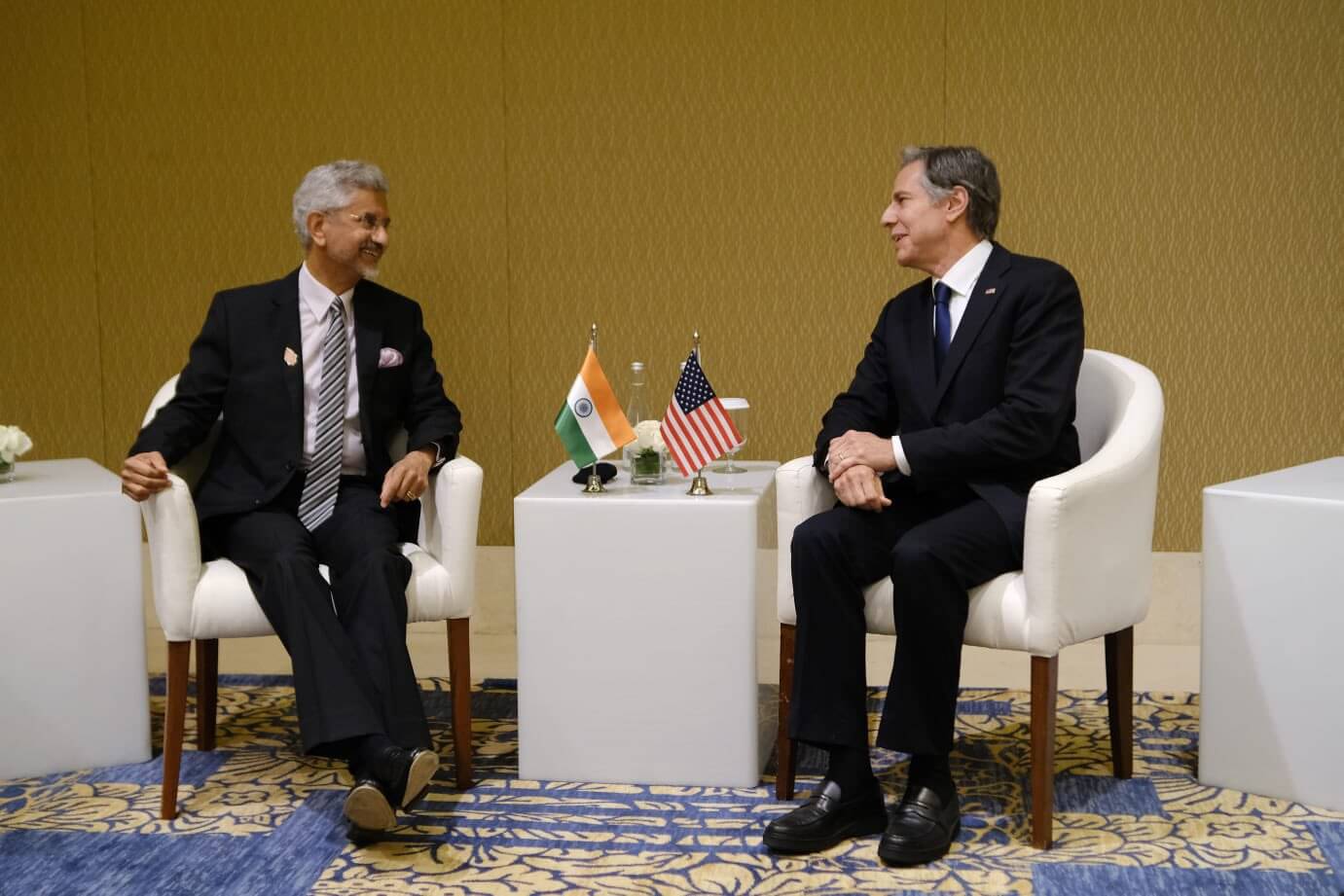In a meeting with his Indian counterpart S. Jaishankar on the sidelines of the Group of 20 (G20) Foreign Ministers’ Summit in Bali last Friday, United States (US) Secretary of State Antony Blinken hailed India as a “great partner” with whom it is collaborating to “mitigate the global implications” of Russia’s invasion of Ukraine.
Blinken stressed that the G20 forum “is a vital institution for trying to deal collectively with some of the most significant problems and challenges that the world faces,” specifically the current food and energy insecurity crises, along with climate change. “Tragically, many of these challenges have been dramatically exacerbated by Russia’s aggression against Ukraine,” he noted.
Met with Indian External Affairs Minister @DrSJaishankar today to discuss how we can further strengthen our bilateral partnership as well as collective efforts to address the implications of Russia’s war against Ukraine. pic.twitter.com/7ueD0eRjwN
— Secretary Antony Blinken (@SecBlinken) July 8, 2022
The US leader also referred to the United Nations (UN) Development Program report, which said that about 71 million more are now in poverty due to the Ukraine war. “I think what we’ve heard today already is a strong chorus from around the world – not just the United States – about the need for this aggression to end so that we can actually focus on the challenges that are affecting people in their lives,” he remarked.
In response, Jaishankar expressed concern about how “developing countries find that their options are very constricted” in light of the energy security issue because of debilitating challenges. The pair continued their discussion from their meeting late last month at the Group of Seven (G7) summit in Germany, where Indian Prime Minister (PM) Narendra Modi was invited as a guest.
The G20 summit saw a sharp divide among members, with the US, France, Canada, the United Kingdom (UK), the European Union (EU), Japan and Australia delivering stern criticism of Russia’s military actions against Ukraine while the rest, including India, expressed their hope for a peaceful resolution to the Ukraine war.
In fact, Blinken blamed Russia for the ongoing food security crisis in a speech at the G20 meeting, whereas Russian Foreign Minister Sergey Lavrov asserted, “The US is forcing Europe and the rest of the world to abandon cheap energy resources and to switch to much more expensive ones.”
Besides India, the US and Russia, the G20 comprises Argentina, Australia, Brazil, Canada, China, France, Germany, Indonesia, Italy, Japan, Republic of Korea, Mexico, Saudi Arabia, South Africa, Turkey, the UK and the EU.
Continued the conversation with @SecBlinken on global and regional issues, this time at Bali #G20FMM.
— Dr. S. Jaishankar (@DrSJaishankar) July 8, 2022
Our relationship today allows us to approach a range of challenges with greater understanding and openness. pic.twitter.com/kiktiWYBO0
Meanwhile, India’s Russian oil imports have surged over 50 times since April and currently make up for 10% of the country’s total oil imports. New Delhi has been buying Russian oil at a “heavy discount” since March in a bid to bring down surging prices. This led to US President Joe Biden singling out India as the only Quad ally with a “somewhat shaky” response to the Ukraine crisis.
While India has continued to urge Russia and Ukraine to end the hostilities through diplomacy, it has refrained from condemning Moscow’s military aggression directly. It has also abstained from UN Security Council and General Assembly resolutions that have sought to denounce Russia’s aggressive actions.
In April, US officials stated that while Washington has “no objection” to New Delhi purchasing oil from Moscow, so long as it is at a discount, it warned that Washington may impose “consequences” on countries that circumvent its sanctions. In fact, Director of the White House National Economic Council Brian Deese in April cautioned India against a “more explicit strategic alignment” with Russia, saying it this could have “significant and long-term” consequences for New Delhi.
.@SecBlinken and @DrSJaishanker met today at the #G20FMM and discussed enhancing regional economic stability and security, including global efforts to reduce the crisis in Ukraine. We look forward to expanding our ties with India. #USIndia https://t.co/j6w829roUg
— Ned Price (@StateDeptSpox) July 8, 2022
Though then-White House Press Secretary Jen Psaki said that the US understands the reasoning behind India’s decision to purchase discounted Russian oil but warned that although the Biden administration will not be placing secondary sanctions against its key ally, India must avoid falling on the “wrong side of history.”
Furthermore, during a virtual meeting with Modi in April, Biden made it clear that it would not be in India’s best interest to “accelerate or increase” Russian energy imports, and expressed his willingness to help New Delhi diversify its energy imports and reduce its reliance on Russian oil.
India has dismissed these criticisms and said that its “legitimate energy transactions should not be politicised.”
Meanwhile, Jaishankar also held a bilateral meeting with Lavrov at the G20 summit to discuss regional and global issues, including the Ukraine crisis and the situation in Afghanistan. This meeting comes against the backdrop of Modi speaking with Russian President Vladimir Putin last week, wherein Putin reassured him that the aim is to incapacitate Ukraine’s military infrastructure and not target civilians.

